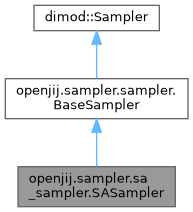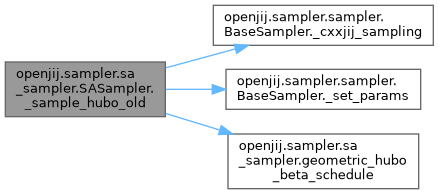

Public Member Functions | |
| parameters (self) | |
| __init__ (self) | |
| "oj.sampler.response.Response" | sample (self, Union["openj.model.model.BinaryQuadraticModel", dimod.BinaryQuadraticModel] bqm, Optional[float] beta_min=None, Optional[float] beta_max=None, Optional[int] num_sweeps=None, Optional[int] num_reads=None, Optional[list] schedule=None, Optional[Union[list, dict]] initial_state=None, Optional[str] updater=None, Optional[bool] sparse=None, Optional[bool] reinitialize_state=None, Optional[int] seed=None) |
| sample_hubo (self, dict[tuple, float] J, Optional[str] vartype=None, int num_sweeps=1000, int num_reads=1, int num_threads=1, Optional[float] beta_min=None, Optional[float] beta_max=None, str updater="METROPOLIS", str random_number_engine="XORSHIFT", Optional[int] seed=None, str temperature_schedule="GEOMETRIC") | |
 Public Member Functions inherited from openjij.sampler.sampler.BaseSampler Public Member Functions inherited from openjij.sampler.sampler.BaseSampler | |
| sample_ising (self, h, J, **parameters) | |
| sample_qubo (self, Q, **parameters) | |
Public Attributes | |
| schedule_info | |
 Public Attributes inherited from openjij.sampler.sampler.BaseSampler Public Attributes inherited from openjij.sampler.sampler.BaseSampler | |
| sample_ising | |
| sample_qubo | |
Protected Member Functions | |
| _convert_validation_schedule (self, schedule) | |
| "openjij.sampler.response.Response" | _sample_hubo_old (self, Union[dict, "openj.model.model.BinaryPolynomialModel", cimod.BinaryPolynomialModel] J, Optional[str] vartype=None, Optional[float] beta_min=None, Optional[float] beta_max=None, Optional[int] num_sweeps=None, Optional[int] num_reads=None, Optional[list] schedule=None, Optional[Union[list, dict]] initial_state=None, Optional[str] updater=None, Optional[bool] reinitialize_state=None, Optional[int] seed=None) |
 Protected Member Functions inherited from openjij.sampler.sampler.BaseSampler Protected Member Functions inherited from openjij.sampler.sampler.BaseSampler | |
| _set_params (self, **kwargs) | |
| _sampling (self, **kwargs) | |
| _cxxjij_sampling (self, model, init_generator, algorithm, system, reinitialize_state=None, seed=None, offset=None) | |
| _get_result (self, system, model) | |
Protected Attributes | |
| _default_params | |
| _params | |
| _make_system | |
| _algorithm | |
Additional Inherited Members | |
 Static Public Attributes inherited from openjij.sampler.sampler.BaseSampler Static Public Attributes inherited from openjij.sampler.sampler.BaseSampler | |
| properties = dict() | |
Detailed Description
Sampler with Simulated Annealing (SA).
Args:
beta_min (float):
Minmum beta (inverse temperature).
You can overwrite in methods .sample_*.
beta_max (float):
Maximum beta (inverse temperature).
You can overwrite in methods .sample_*.
num_reads (int):
number of sampling (algorithm) runs. defaults None.
You can overwrite in methods .sample_*.
num_sweeps (int):
number of MonteCarlo steps during SA. defaults None.
You can overwrite in methods .sample_*.
schedule_info (dict):
Information about an annealing schedule.
Raises:
ValueError: If schedules or variables violate as below.
- not list or numpy.array.
- not list of tuple (beta : float, step_length : int).
- beta is less than zero.
Constructor & Destructor Documentation
◆ __init__()
| openjij.sampler.sa_sampler.SASampler.__init__ | ( | self | ) |
Member Function Documentation
◆ _convert_validation_schedule()
|
protected |
Checks if the schedule is valid and returns cxxjij schedule.
Referenced by openjij.sampler.sqa_sampler.SQASampler._annealing_schedule_setting().

◆ _sample_hubo_old()
|
protected |
Sampling from higher order unconstrainted binary optimization.
Args:
J (dict): Interactions.
vartype (str, openjij.VarType): "SPIN" or "BINARY".
beta_min (float, optional): Minimum beta (initial inverse temperature). Defaults to None.
beta_max (float, optional): Maximum beta (final inverse temperature). Defaults to None.
schedule (list, optional): schedule list. Defaults to None.
num_sweeps (int, optional): number of sweeps. Defaults to None.
num_reads (int, optional): number of reads. Defaults to 1.
init_state (list, optional): initial state. Defaults to None.
reinitialize_state (bool): if true reinitialize state for each run
seed (int, optional): seed for Monte Carlo algorithm. Defaults to None.
Returns:
:class:`openjij.sampler.response.Response`: results
Examples::
for Ising case::
>>> sampler = openjij.SASampler()
>>> J = {(0,): -1, (0, 1): -1, (0, 1, 2): 1}
>>> response = sampler.sample_hubo(J, "SPIN")
for Binary case::
>>> sampler = ooenjij.SASampler()
>>> J = {(0,): -1, (0, 1): -1, (0, 1, 2): 1}
>>> response = sampler.sample_hubo(J, "BINARY")
References openjij.sampler.sampler.BaseSampler._cxxjij_sampling(), openjij.sampler.csqa_sampler.CSQASampler._params, openjij.sampler.sa_sampler.SASampler._params, openjij.sampler.sqa_sampler.SQASampler._params, openjij.sampler.sampler.BaseSampler._set_params(), openjij.sampler.sa_sampler.geometric_hubo_beta_schedule(), openjij.sampler.sa_sampler.SASampler.schedule_info, and openjij.sampler.sqa_sampler.SQASampler.schedule_info.
Referenced by openjij.sampler.sa_sampler.SASampler.sample_hubo().


◆ parameters()
| openjij.sampler.sa_sampler.SASampler.parameters | ( | self | ) |
Reimplemented from openjij.sampler.sampler.BaseSampler.
◆ sample()
| "oj.sampler.response.Response" openjij.sampler.sa_sampler.SASampler.sample | ( | self, | |
| Union[ "openj.model.model.BinaryQuadraticModel", dimod.BinaryQuadraticModel ] | bqm, | ||
| Optional[float] | beta_min = None, |
||
| Optional[float] | beta_max = None, |
||
| Optional[int] | num_sweeps = None, |
||
| Optional[int] | num_reads = None, |
||
| Optional[list] | schedule = None, |
||
| Optional[Union[list, dict]] | initial_state = None, |
||
| Optional[str] | updater = None, |
||
| Optional[bool] | sparse = None, |
||
| Optional[bool] | reinitialize_state = None, |
||
| Optional[int] | seed = None |
||
| ) |
Sample Ising model.
Args:
bqm (openjij.model.model.BinaryQuadraticModel) binary quadratic model
beta_min (float): minimal value of inverse temperature
beta_max (float): maximum value of inverse temperature
num_sweeps (int): number of sweeps
num_reads (int): number of reads
schedule (list): list of inverse temperature
initial_state (dict): initial state
updater(str): updater algorithm
sparse (bool): use sparse matrix or not.
reinitialize_state (bool): if true reinitialize state for each run
seed (int): seed for Monte Carlo algorithm
Returns:
:class:`openjij.sampler.response.Response`: results
Examples:
for Ising case::
>>> h = {0: -1, 1: -1, 2: 1, 3: 1}
>>> J = {(0, 1): -1, (3, 4): -1}
>>> sampler = openj.SASampler()
>>> res = sampler.sample_ising(h, J)
for QUBO case::
>>> Q = {(0, 0): -1, (1, 1): -1, (2, 2): 1, (3, 3): 1, (4, 4): 1, (0, 1): -1, (3, 4): 1}
>>> sampler = openj.SASampler()
>>> res = sampler.sample_qubo(Q)
Reimplemented from openjij.sampler.sampler.BaseSampler.
References openjij.sampler.csqa_sampler.CSQASampler._params, openjij.sampler.sa_sampler.SASampler._params, openjij.sampler.sqa_sampler.SQASampler._params, openjij.sampler.sampler.BaseSampler._set_params(), and openjij.sampler.sa_sampler.geometric_ising_beta_schedule().
Referenced by openjij.sampler.sampler.BaseSampler.sample_ising(), and openjij.sampler.sampler.BaseSampler.sample_qubo().


◆ sample_hubo()
| openjij.sampler.sa_sampler.SASampler.sample_hubo | ( | self, | |
| dict[tuple, float] | J, | ||
| Optional[str] | vartype = None, |
||
| int | num_sweeps = 1000, |
||
| int | num_reads = 1, |
||
| int | num_threads = 1, |
||
| Optional[float] | beta_min = None, |
||
| Optional[float] | beta_max = None, |
||
| str | updater = "METROPOLIS", |
||
| str | random_number_engine = "XORSHIFT", |
||
| Optional[int] | seed = None, |
||
| str | temperature_schedule = "GEOMETRIC" |
||
| ) |
Sampling from higher order unconstrainted binary optimization.
Args:
J (dict): Interactions.
vartype (str): "SPIN" or "BINARY".
num_sweeps (int, optional): The number of sweeps. Defaults to 1000.
num_reads (int, optional): The number of reads. Defaults to 1.
num_threads (int, optional): The number of threads. Parallelized for each sampling with num_reads > 1. Defaults to 1.
beta_min (float, optional): Minimum beta (initial inverse temperature). Defaults to None.
beta_max (float, optional): Maximum beta (final inverse temperature). Defaults to None.
updater (str, optional): Updater. One can choose "METROPOLIS", "HEAT_BATH", or "k-local". Defaults to "METROPOLIS".
random_number_engine (str, optional): Random number engine. One can choose "XORSHIFT", "MT", or "MT_64". Defaults to "XORSHIFT".
seed (int, optional): seed for Monte Carlo algorithm. Defaults to None.
temperature_schedule (str, optional): Temperature schedule. One can choose "LINEAR", "GEOMETRIC". Defaults to "GEOMETRIC".
Returns:
:class:`openjij.sampler.response.Response`: results
Examples::
for Ising case::
>>> sampler = openjij.SASampler()
>>> J = {(0,): -1, (0, 1): -1, (0, 1, 2): 1}
>>> response = sampler.sample_hubo(J, "SPIN")
for Binary case::
>>> sampler = ooenjij.SASampler()
>>> J = {(0,): -1, (0, 1): -1, (0, 1, 2): 1}
>>> response = sampler.sample_hubo(J, "BINARY")
References openjij.sampler.sa_sampler.SASampler._sample_hubo_old().

Member Data Documentation
◆ _algorithm
|
protected |
Referenced by openjij.sampler.sqa_sampler.SQASampler.sample().
◆ _default_params
|
protected |
Referenced by openjij.sampler.sampler.BaseSampler._set_params().
◆ _make_system
|
protected |
Referenced by openjij.sampler.sqa_sampler.SQASampler.sample().
◆ _params
|
protected |
Referenced by openjij.sampler.sqa_sampler.SQASampler._annealing_schedule_setting(), openjij.sampler.sa_sampler.SASampler._sample_hubo_old(), openjij.sampler.sampler.BaseSampler._set_params(), openjij.sampler.sa_sampler.SASampler.sample(), openjij.sampler.sqa_sampler.SQASampler.sample(), and openjij.sampler.csqa_sampler.CSQASampler.sample_ising().
◆ schedule_info
| openjij.sampler.sa_sampler.SASampler.schedule_info |
The documentation for this class was generated from the following file: